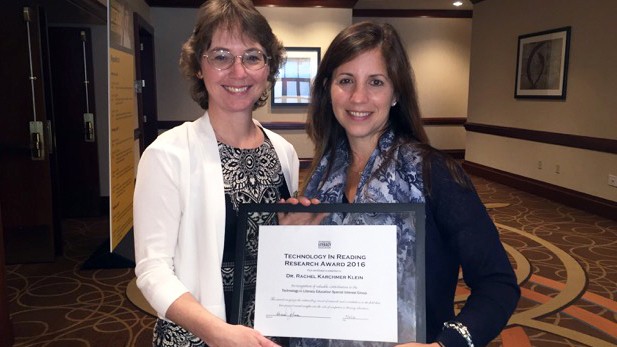School of Education
Karchmer-Klein receives 2016 Technology in Reading Research Award

Rachel Karchmer-Klein, associate professor in the University of Delaware School of Education, has received the 2016 Technology in Reading Research Award from the International Literacy Association’s (ILA) Technology in Literacy Education Special Interest Group (TILE-SIG).
The award honors reading researchers who have made a significant contribution to research on classroom literacy instruction and technology integration.
Karchmer-Klein’s research centers on the complex relationships between internet technologies and reading and writing. Her work examines how educators can use technology to strengthen students’ literacy development.
Karchmer-Klein and her colleagues, for example, recently explored middle school teachers’ use of educational applications (apps) on iPads during classroom literacy instruction.
She found that teachers who valued the role of technology in learning designed instruction that allowed students to use multiple modes of representation–such as images, sound and words–to read and write digital content. Students were also given opportunities to share their work with peers and provide each other with constructive feedback.
These opportunities strengthened students’ 21st-century literacy skills while also building discipline-specific content knowledge.
“The role of technology in our professional and personal lives cannot be understated. We must recognize how it redefines what it means to be literate in today’s society and learn to leverage its affordances to provide students with meaningful learning opportunities,” Karchmer-Klein explained. “My recent work takes a careful look at instructional design and how systematic, intentional teaching can prepare students to be thoughtful, active consumers and producers of content in digital spaces. This approach to technology integration not only creates a motivating environment in which to learn, but also provides an outlet for students to showcase their creativity and be heard.”
Her work has been published in a range of literacy and instructional technology journals, including Reading Research Quarterly, The Reading Teacher, Journal of Research on Technology in Education and Computers and Education. She serves on the editorial review boards for several literacy journals, chairs the Literacy Research Association’s Publications Committee and is a member of the Board of Directors of the ILA.
Karchmer-Klein has pioneered the development of high quality, online instruction at the University of Delaware. She serves as the program coordinator for the School of Education’s M.Ed. in Teacher Leadership, the School of Education’s first entirely online program.
The program prepares practicing teachers to lead from the classroom by coaching their colleagues, fostering professional collaborations, addressing equity and diversity issues impacting their school environments, and affecting institutional change.
In addition to designing and teaching courses, Karchmer-Klein organizes virtual information sessions, leads virtual job search sessions and advises all matriculated students.
This summer, the College of Education and Human Development graduated its first cohort of M.Ed. in Teacher Leadership students. The graduating class includes 16 practicing teachers in grades K-12 and higher education from Delaware, Maryland, Pennsylvania, New Jersey and Virginia.
“Dr. Karchmer-Klein is a well-respected scholar in literacy and educational technology, with significant contributions in Delaware, regionally, and nationally. She has set herself apart as a thoughtful, skilled and reflective educator, with the dispositions to continue her own learning and to support the growth and development of colleagues,” said Elizabeth Farley-Ripple, associate director of the School of Education. “She has always communicated new ideas, shared results of her experimentation and encouraged other faculty to teach online. Her work as the Teacher Leadership program coordinator has been critically important in the success of the program.”
Article by Jessica Henderson
Photo provided by Rachel Karchmer-Klein



